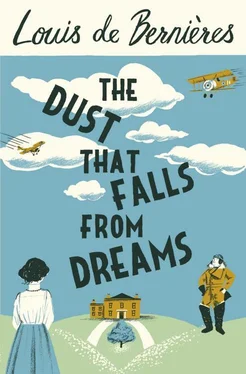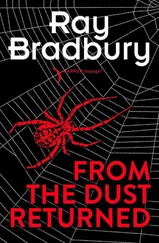But Rosie was following her own train of thought. ‘One of the nurses at Netley could see the souls of the dying leaving their bodies.’
‘You believed her?’
Rosie was already thinking of something else, and did not answer. ‘I want to confess something to you.’
‘What? As in a confessional?’
‘No, no. I mean I have a burden and it troubles me very greatly, and I’d like to tell you.’
‘Please do,’ he said. ‘A trouble shared is a trouble halved, as they say.’
‘Captain Fairhead, I promised Ash I would pray for him every night, and I always did. Except the night before he was wounded.’
‘Oh,’ said Fairhead glumly, understanding at once, ‘that’s awful for you.’
‘I can’t help it, I know it’s silly. I can’t help feeling that if I had remembered to pray, Ash wouldn’t have been killed.’
Fairhead reacted almost angrily. ‘My dear Miss McCosh, you completely misunderstand the nature of God. I am the last person to say that he understands what God is up to, but I do know that prayer is not the same as casting a spell.’
Rosie felt unable to explain to him that she had a special relationship with the Mother of God. For her the Virgin was like a human being, who could be forgetful if not frequently reminded. It was the Virgin’s intervention that she’d sought every night.
‘Do you think there’s any point in praying to saints?’ she asked.
‘I don’t know,’ said Fairhead. ‘I don’t know if saints have the power to intervene. Roman Catholics think they do. But we’re Anglicans, Miss McCosh. It seems to me that we’re a kind of halfway house between Luther and the Pope. We do assume that we have a direct line to God, though, so there really isn’t any point in praying to saints, even if it does no harm. Why talk to a minister when you can go straight to the King?’
‘I suppose you’re right,’ said Rosie. ‘Do you know “The Wayfarers”? By Brooke?’
‘No, I can’t say I remember it.’
Rosie went over to the sideboard and came back with a slim book. She leafed through it, and presented it to Captain Fairhead at an open page. He took it to the window and read aloud:
‘Is it the hour? We leave this resting-place
Made fair by one another for a while.
Now, for a god-speed, one last mad embrace;
The long road then, unlit by your faint smile.
Ah! the long road! And you so far away!
Oh, I’ll remember! But … each crawling day
Will pale a little your scarlet lips, each mile
Dull the dear pain of your remembered face.
… Do you think there’s a far border town, somewhere,
The desert’s edge, last of the lands we know,
Some gaunt eventual limit of our light,
In which I’ll find you waiting; and we’ll go
Together, hand in hand again, out there,
Into the waste we know not, into the night?’
‘How beautifully you read that!’ said a playful voice from the doorway. It was Sophie, returned from the Tarn, where she had been throwing stale bread for the ducks. The chaplain strode towards her, extending his hand, feeling unaccountably delighted. ‘Sorry about my cold hands,’ said Sophie. ‘I got quite perished at the Tarn and am probably going to die of ammonia. How fortu-nate to have a priest in the house!’
After he had left, with a light step and an invitation to return for tea the following Tuesday, Sophie said, ‘Did you notice that he has the ribbon of the Military Cross on his tunic? I do so wonder what he did.’
‘He had an oak leaf as well,’ said Rosie.
‘An heroic clergyman!’ exclaimed Sophie. ‘How marvellously anonymous!’
‘Anonymous?’
‘Oh, is that wrong? I mean that word which means that something doesn’t quite fit. I’m always getting them muddled up.’
‘Anomalous?’
‘Well, it’s almost the same.’
‘Think of all the martyrs. Hooper, Ridley and Latimer. People like that,’ said Rosie. ‘It’s not unusual at all.’
‘But that was such a long time ago,’ said Sophie. ‘The Church of England simply doesn’t do saints and martyrs any more. Not since we were in the caves.’
‘Mary Tudor lived in a cave?’
‘Surely not,’ said Sophie, ‘I am quite certain we must have been in grass huts by then. Probably with wattle and daub and a hole to let the smoke out.’ She reflected a moment, and asked, ‘How did we burn people at the stake before the invention of matches?’
‘Tinder and flint,’ said Rosie. ‘I hear that birch bark catches very easily. I suppose that if you wanted fire you knocked on people’s doors until you found someone with something in the brazier or on the stove, and you lit your spill and rushed home with it. Or to the pyre. I did hear of a case where all the local people put out their cooking fires so that some martyrs couldn’t be burned. I wish I could remember where it was. It might have been Spain.’
‘What a dreadful fag, having to make sparks. It would certainly put me off trying to burn anyone. And how do people catch fire anyway? One isn’t exactly comestible.’
‘Combustible, Sophie!’ Rosie’s face fell dark. ‘Actually, people are highly combustible. The fat catches fire. It’s utterly horrible. You don’t usually die of being burned though. You die from inhaling the fumes.’
‘I do so admire you, being a nurse,’ said Sophie quietly.
HE IS STANDING on a steep and stony hillside above a road that is curving downwards, round to his right, where it enters a wide tunnel whose mouth is shaped like a half-moon.
He is clutching a small ginger cat to his chest, and is looking out over a mountainous landscape that is all the several shades of charcoal grey and indigo blue. He has never seen the world in these colours before. Even the air and the sky are blue-grey, like the ugly ink supplied by schools for dip pens. He makes no note of the temperature and has no idea of the time or the season. He is in a world without temperature, time or season, but he is in shirtsleeve order with no cap on his head. He does not know why he is there, but is not puzzled about it either. He just stands and looks down at the road, with the ginger cat in his arms. Nothing is happening and the universe is still.
Suddenly there is a grinding and shrieking of metal, a roaring of engines comes from the tunnel, and two Mark IV tanks emerge. The khaki paint has been burned off, and now their partially rusted metal is of the same hue as the rest of this world. They are going at high speed, even though they are both burned out and smashed, and one of them has no tracks on the side facing him. They produce no exhaust. He watches in puzzlement as they pass. He thinks, ‘They should not be able to move at all.’
The small ginger cat panics, struggles and resists his attempts to hold on to it. It scrabbles out of his arms and hides between two rocks that are behind him. He makes a note of where it is, because he wants to be able to find it when the hideous noise has ceased.
Behind the tanks a squad of men emerge, leaning into the ropes with which they are dragging the wreck of a flying machine. He thinks it is an Aviatik, and the pilot is still seated in it, one arm over the side, and his head lolling. Along the fuselage he sees a neat and gently curving line of bullet holes. The propeller is broken. He hears the scraping noise as the plane is dragged along.
The men drawing the plane are like those who emerge from the tunnel after them, marching in endless streams together in lines of four abreast. They are dead men, in all the many states of decomposition. It is difficult to discern their nationality because their uniforms are as decayed as they are, but he thinks that the Germans are coming first, and then the Italians, and then the Turks. He knows without being told that these Italians died on the Isonzo, these Germans at Cambrai, these Turks in Mesopotamia. He wonders where the French and British are, but just now it is the horses that are emerging from the tunnel, shire horses, hunters, cavalry horses, pit ponies and cobs. They too are dead, and he wonders how it is possible for so many men and horses to be passing by when they have legs missing, or no legs at all. He thinks it strange that there is no stench, and that the bones do not creak as they rub.
Читать дальше












